Sonnet 18 诗歌赏析
赏析莎士比亚十四行诗第十八首

123
学教育 2010.02
硕士论坛
法一一细数开来,如明喻、暗喻、拟人、矛盾修饰 法等等,不少于十种。
明喻 (simile) 和设问(rhetoric question)的使用。 诗 歌 中 的 第 一 行 “ Shall I compare thee to a summer's day? (能不能让我来把你比作夏日?)” 就使用了明喻和设问两种修辞手法。明喻是对表面 上不相似的东西进行明确的ห้องสมุดไป่ตู้拟,找出两者的相似 之处。夏天和“你”的相似之处就是都是美的体现。 这一句同时也是一个设问句,即它形式上是个疑问 句,但不需要作答,因为它的答案本身就很清楚。 也就是说,诗人提出这个问题来并不是作回答,而 是要表达“我要将你比作夏日”,而且这个设问句用 得非常巧妙。其一它比用陈述句“I shall compare thee to a summer’ s day” 语 气 要 委 婉 礼 貌 得 多;其二是从整首诗的韵律格局来考虑的,即用“I shall”属于扬抑格,“shall I”属於抑扬格,而整 首诗的格律是五步抑扬格,所以诗人用的是“Shall I …”而不是“I shall…”,可谓一箭双雕,我们 不得不佩服他的别出心裁。
sonnet18—byWilliamShakespeare赏析
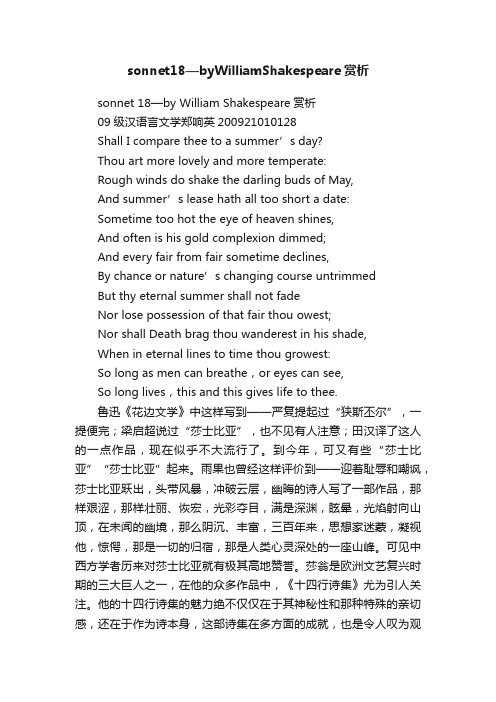
sonnet18—byWilliamShakespeare赏析sonnet 18—by William Shakespeare赏析09级汉语言文学郑响英200921010128Shall I compare thee to a summer’s day?Thou art more lovely and more temperate:Rough winds do shake the darling buds of May,And summer’s lease hath all too short a date:Sometime too hot the eye of heaven shines,And often is his gold complexion dimmed;And every fair from fair sometime declines,By chance or nature’s changing course untrimmedBut thy eternal summer shall not fadeNor lose possession of that fair thou owest;Nor shall Death brag thou wanderest in his shade,When in eternal lines to time thou growest:So long as men can breathe,or eyes can see,So long lives,this and this gives life to thee.鲁迅《花边文学》中这样写到——严复提起过“狭斯丕尔”,一提便完;梁启超说过“莎士比亚”,也不见有人注意;田汉译了这人的一点作品,现在似乎不大流行了。
到今年,可又有些“莎士比亚”“莎士比亚”起来。
雨果也曾经这样评价到——迎着耻辱和嘲讽,莎士比亚跃出,头带风暴,冲破云层,幽晦的诗人写了一部作品,那样艰涩,那样壮丽、恢宏,光彩夺目,满是深渊,眩晕,光焰射向山顶,在未闻的幽境,那么阴沉、丰富,三百年来,思想家迷蒙,凝视他,惊愕,那是一切的归宿,那是人类心灵深处的一座山峰。
十四行诗第十八首
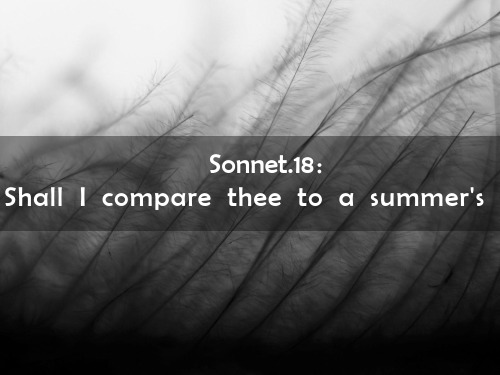
起承转合
表 年 凡头明轻响四他友的行所 人 美是歌 的 丽“颂 不 ;起的 同”承,宣貌所过后告难爱他四虽以的的行然存人不是别留却朽“人,可的转的可以诗”美他通篇, 来得以永存
合
中间四行是
最后两行是“合”,是对 一首诗所作的小结。以富
起
“承”,讲岁 月无常,青春 难驻
转有诗思歌辨艺的术以语及言所总歌结颂了对人象类、 之间的关联:只要人类尚
Part 2
诗歌欣赏
Shall I compare thee to a summer's day? Thou art more lovely and more temperate, Rough winds do shake the darling buds of May, And summer's lease hath all too short a date. Sometime too hot the eye of heaven shines, And often is his gold complexion dimm'd, And every fair from fair sometime declines, By chance or nature's changing course untrimm'd, But thy eternal summer shall not fade. Nor lose possession of that fair thou owest, Nor shall Death brag thou wander'st in his shade When in eternal lines to time thou growest. So long as men can breathe or eyes can see, So long lives this and this gives life to thee.
莎士比亚十四行诗第18首鉴赏
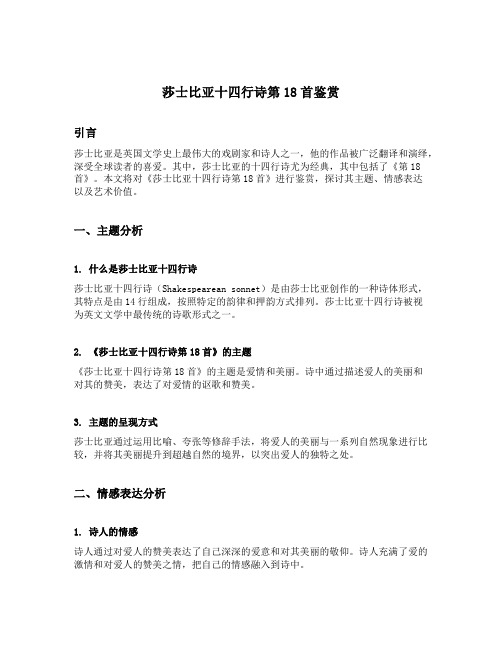
莎士比亚十四行诗第18首鉴赏引言莎士比亚是英国文学史上最伟大的戏剧家和诗人之一,他的作品被广泛翻译和演绎,深受全球读者的喜爱。
其中,莎士比亚的十四行诗尤为经典,其中包括了《第18首》。
本文将对《莎士比亚十四行诗第18首》进行鉴赏,探讨其主题、情感表达以及艺术价值。
一、主题分析1. 什么是莎士比亚十四行诗莎士比亚十四行诗(Shakespearean sonnet)是由莎士比亚创作的一种诗体形式,其特点是由14行组成,按照特定的韵律和押韵方式排列。
莎士比亚十四行诗被视为英文文学中最传统的诗歌形式之一。
2. 《莎士比亚十四行诗第18首》的主题《莎士比亚十四行诗第18首》的主题是爱情和美丽。
诗中通过描述爱人的美丽和对其的赞美,表达了对爱情的讴歌和赞美。
3. 主题的呈现方式莎士比亚通过运用比喻、夸张等修辞手法,将爱人的美丽与一系列自然现象进行比较,并将其美丽提升到超越自然的境界,以突出爱人的独特之处。
二、情感表达分析1. 诗人的情感诗人通过对爱人的赞美表达了自己深深的爱意和对其美丽的敬仰。
诗人充满了爱的激情和对爱人的赞美之情,把自己的情感融入到诗中。
2. 诗中情感的转折《莎士比亚十四行诗第18首》中情感经历了由赞美到忧伤的转折。
在诗的前几行,诗人对爱人进行了赞美,表达了自己对其美丽的深深敬仰之情。
然而,在诗的后半部分,情感转向了忧伤,诗人担心时间的流逝会将爱人的美丽消逝,这种忧伤的情感为整首诗增添了深刻的情感色彩。
三、艺术价值分析1. 诗歌运用的修辞手法《莎士比亚十四行诗第18首》使用了丰富多样的修辞手法,比如比喻、夸张、对比等,这些修辞手法使整首诗充满了艺术魅力,具有很高的艺术价值。
2. 渲染的意境诗中通过对爱人美丽的描绘和对时间流逝的担忧,营造了一种诗意的意境。
诗人通过对自然现象的描绘,将爱人的美丽与大自然相较,突出了爱人的独特之处,同时也增加了诗歌的艺术感染力。
3. 对爱情的思考《莎士比亚十四行诗第18首》可以说是对爱情最美丽和深刻的思考之一。
Sonnet18赏析

赏析:莎士比亚所处的英国伊莉莎白时代是爱情诗的盛世,写十四行诗更是一种时髦。
莎士比亚的十四行诗无疑是那个时代的佼佼者,其十四行诗集更是流传至今,魅力不减。
他的十四行诗一扫当时诗坛的矫柔造作、绮艳轻糜、空虚无力的风气。
据说,莎士比亚的十四行诗是献给两个人的:前126首献给一个贵族青年,后面的献给一个黑肤女郎。
这首诗是十四行诗集中的第18首,属前者。
也有人说,他的十四行诗是专业的文学创作。
当然,这些无关宏旨,诗歌本身是伟大的。
莎士比亚的十四行诗总体上表现了一个思想:爱征服一切。
他的诗充分肯定了人的价值、赞颂了人的尊严、个人的理性作用。
诗人将抽象的概念转化成具体的形象,用可感可见的物质世界,形象生动地阐释了人文主义的命题。
诗的开头将“你”和夏天相比较。
自然界的夏天正处在绿的世界中,万物繁茂地生长着,繁阴遮地,是自然界的生命最昌盛的时刻。
那醉人的绿与鲜艳的花一道,将夏天打扮得五彩缤纷、艳丽动人。
但是,“你”却比夏天可爱多了,比夏天还要温婉。
五月的狂风会作践那可爱的景色,夏天的期限太短,阳光酷热地照射在繁阴班驳的大地上,那熠熠生辉的美丽不免要在时间的流动中凋残。
这自然界最美的季节和“你”相比也要逊色不少。
而“你”能克服这些自然界的不足。
“你”在最灿烂的季节不会凋谢,甚至“你”美的任何东西都不会有所损失。
“你”是人世的永恒,“你”会让死神的黑影在遥远的地方停留,任由死神的夸口也不会死去。
“你”是什么“你”与人类同在,你在时间的长河里不朽。
那人类精神的精华——诗,是你的形体吗或者,你就是诗的精神,就是人类的灵魂。
诗歌在形式上一改传统的意大利十四行诗四四三三体,而是采用了四四四二体:在前面充分地发挥表达的层次,在充分的铺垫之后,用两句诗结束全诗,点明主题。
全诗用新颖巧妙的比喻,华美而恰当的修饰使人物形象鲜明、生气鲜活。
诗人用形象的表达使严谨的逻辑推理变得生动有趣、曲折跌宕,最终巧妙地得出了人文主义的结论。
Shakespeare - Sonnet 18 This sonnet is by far one of the most interesting poems in the book. Of Shakespeare's sonnets in the text, this is one of the most moving lyric poems that I have ever read. There is great use of imagery within the sonnet. This is not to say that the rest of the poems in the book were not good, but this to me was the best, most interesting, and most beautiful of them. It is mainly due to the simplicity and loveliness of the poem抯praise of the beloved woman that it has guaranteed its place in my mind, and speaker of the poem opens with a question that is addressed to the beloved, "Shall I compare thee to a summer's day" This question is comparing her to the summer time of the year. It is during this time when the flowers are blooming, trees are full of leaves, the weather is warm, and it is generally thought of as an enjoyable time during the year. The following eleven lines in the poem are also dedicated to similar comparisons between the beloved and summer days. In lines 2 and 3, the speaker explains what mainly separates the young woman from the summer's day: she is "more lovely and more temperate." (Line 2) Summer's days tend toward extremes: they are sometimes shaken by "rough winds" (line3) which happens and is not always as welcoming as the woman. However in line 4, the speaker gives the feeling again that the summer months are often to short by saying, "And summer抯lease hath too short a date." In the summer days, the sun, "the eye of heaven" (line 5), often shines "too hot," or too dim, "his gold complexion dimmed" (line 6), that is there are many hot days during the summer but soon the sun begins to set earlier at night because autumn is approaching. Summer is moving along too quickly for the speaker, its time here needs to be longer, and it also means that the chilling of autumn is coming upon us because the flowers will soon be withering, as "every fair from fair sometime declines." (Line 7) The final portion of the sonnet tells how the beloved differs from the summer in various respects. Her beauty will be one that lasts forever, "Thy eternal summer shall not fade." (Line 9), and never end or die. In the couplet at the bottom, the speaker explains how that the beloved's beauty will accomplish this everlasting life unlike a summer. And it is because her beauty is kept alive in this poem, which will last forever. It will live "as long as men can breathe or eyes can see." (Line 13)On the surface, the poem is on the surface simply a statement of praise about the beauty ofthe beloved woman and perhaps summer to the speaker is sometimes too unpleasant with the extremes of windiness and heat that go along with it. However, the beloved in the poem is always mild and temperate by her nature and nothing at all like the summer. It is incidentally brought to life as being described as the "eye of heaven" with its "gold complexion". The imagery throughout the sonnet is simple and attainable to the reader, which is a key factor in understanding the poem. Then the speaker begins to describe the summer again with the "darling buds of May" giving way to the " summer抯lease", springtime moving into the warmth of the summer. The speaker then starts to promise to talk about this beloved, that is so great and awing that she is to live forever in this sonnet. The beloved is so great that the speaker will even go as far as to say that, "So long as men breathe, or eyes can see," the woman will live. The language is almost too simple when comparing it to the rest of Shakespeare抯sonnets; it is not heavy with alliteration or verse, and nearly every line is its own self-contained clause, almost every line ends with some punctuation that effects a pause. But it is this that makes Sonnet18 stand out for the rest in the book. It is much more attainable to understand and it allows for the reader to fully understand how great this beloved truly is because she may live forever in it. An important theme of the sonnet, as it is an important theme throughout much of the poetry in general, is the power of the speaker's poem to defy time and last forever. And so by doing this it is then carrying the beauty of the beloved down to future generations and eventually for al of eternity. The beloved's "eternal summer" shall not fade precisely because it is embodied in the sonnet: "So long as men can breathe or eyes can see," (line 13) the speaker writes in the couplet, "So long lives this, and this gives life to thee."(Line 14) With this the speaker is able to accomplish what many have done in poetry and that is to give the gift of an eternal life to someone that they believe is special and outshines everyone else around them. Perhaps it is because of a physical beauty that the speaker see, but I believe that it is more because of the internal beauty as seen in line 2, "Thou art more lovely and more temperate", that the beloved is deserving to live on forever.。
莎士比亚 sonnet 18 29 66的中文翻译及评析

18莎士比亚的十四行诗总体上表现了一个思想:爱征服一切。
他的诗充分肯定了人的价值、赞颂了人的尊严、个人的理性作用。
诗人将抽象的概念转化成具体的形象,用可感可见的物质世界,形象生动地阐释了人文主义的命题。
诗的开头将“你”和夏天相比较。
自然界的夏天正处在绿的世界中,万物繁茂地生长着,繁阴遮地,是自然界的生命最昌盛的时刻。
那醉人的绿与鲜艳的花一道,将夏天打扮得五彩缤纷、艳丽动人。
但是,“你”却比夏天可爱多了,比夏天还要温婉。
五月的狂风会作践那可爱的景色,夏天的期限太短,阳光酷热地照射在繁阴班驳的大地上,那熠熠生辉的美丽不免要在时间的流动中凋残。
这自然界最美的季节和“你”相比也要逊色不少。
而“你”能克服这些自然界的不足。
“你”在最灿烂的季节不会凋谢,甚至“你”美的任何东西都不会有所损失。
“你”是人世的永恒,“你”会让死神的黑影在遥远的地方停留,任由死神的夸口也不会死去。
“你”是什么?“你”与人类同在,你在时间的长河里不朽。
那人类精神的精华——诗,是你的形体吗?或者,你就是诗的精神,就是人类的灵魂。
诗歌在形式上一改传统的意大利十四行诗四四三三体,而是采用了四四四二体:在前面充分地发挥表达的层次,在充分的铺垫之后,用两句诗结束全诗,点明主题。
全诗用新颖巧妙的比喻,华美而恰当的修饰使人物形象鲜明、生气鲜活。
诗人用形象的表达使严谨的逻辑推理变得生动有趣、曲折跌宕,最终巧妙地得出了人文主义的结论。
二十九首就是其中的一首。
这首诗热情地歌颂爱情,诗人在创作这首诗时,充分发挥了十四行诗的长处,采用了“先抑后扬”手法,层层推进,波澜起伏,道出了诗人的思想感情发展变化过程,开头四句这样写道:When ,in disgrace with Fortune and men’ eyes ,sI all alone beweep my outcast state ,And trouble deaf heaven with my bootless cries ,And look upon myself ,and curse my fate ,从这四句我们可以读出,一开始诗人悲悲切切地唱出自己的悲惨处境“in disgrace with Fortune and,men’ eyes (失去了幸福,又遭人白眼。
Sonnet 18(英文赏析)
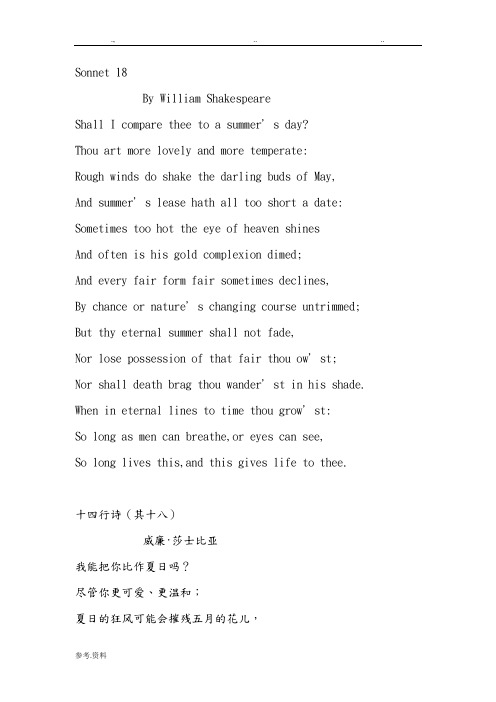
Sonnet 18By William ShakespeareShall I compare thee to a summer’s day?Thou art more lovely and more temperate:Rough winds do shake the darling buds of May, And summer’s lease hath all too short a date: Sometimes too hot the eye of heaven shinesAnd often is his gold complexion dimed;And every fair form fair sometimes declines,By chance or nature’s changing course untrimmed; But thy eternal summer shall not fade,Nor lose possession of that fair thou ow’st;Nor shall death brag thou wander’st in his shade. When in eternal lines to time thou grow’st:So long as men can breathe,or eyes can see,So long lives this,and this gives life to thee.十四行诗(其十八)威廉·莎士比亚我能把你比作夏日吗?尽管你更可爱、更温和;夏日的狂风可能会摧残五月的花儿,季节的限制又减少了可拥有的日光;天空的巨眼有时过于灼热,常使自身的辉煌无故湮没;每一种美都会消逝,不管愿意或是无奈;然而你这盛夏将永存不朽,连你所有的美都不会褪去;死神不忍逼近,生命只会长存;只要人类能呼吸,能看见;我的诗就会存在,而你的生命也会延续。
赏析威廉莎士比亚的十四行诗
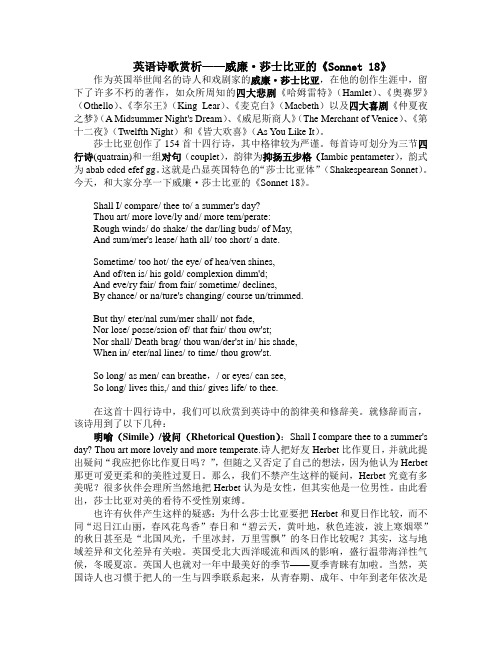
英语诗歌赏析——威廉·莎士比亚的《Sonnet 18》作为英国举世闻名的诗人和戏剧家的威廉·莎士比亚,在他的创作生涯中,留下了许多不朽的著作,如众所周知的四大悲剧《哈姆雷特》(Hamlet)、《奥赛罗》(Othello)、《李尔王》(King Lear)、《麦克白》(Macbeth)以及四大喜剧《仲夏夜之梦》(A Midsummer Night's Dream)、《威尼斯商人》(The Merchant of Venice)、《第十二夜》(Twelfth Night)和《皆大欢喜》(As You Like It)。
莎士比亚创作了154首十四行诗,其中格律较为严谨。
每首诗可划分为三节四行诗(quatrain)和一组对句(couplet),韵律为抑扬五步格(Iambic pentameter),韵式为abab cdcd efef gg。
这就是凸显英国特色的“莎士比亚体”(Shakespearean Sonnet)。
今天,和大家分享一下威廉·莎士比亚的《Sonnet 18》。
Shall I/ compare/ thee to/ a summer's day?Thou art/ more love/ly and/ more tem/perate:Rough winds/ do shake/ the dar/ling buds/ of May,And sum/mer's lease/ hath all/ too short/ a date.Sometime/ too hot/ the eye/ of hea/ven shines,And of/ten is/ his gold/ complexion dimm'd;And eve/ry fair/ from fair/ sometime/ declines,By chance/ or na/ture's changing/ course un/trimmed.But thy/ eter/nal sum/mer shall/ not fade,Nor lose/ posse/ssion of/ that fair/ thou ow'st;Nor shall/ Death brag/ thou wan/der'st in/ his shade,When in/ eter/nal lines/ to time/ thou grow'st.So long/ as men/ can breathe,/ or eyes/ can see,So long/ lives this,/ and this/ gives life/ to thee.在这首十四行诗中,我们可以欣赏到英诗中的韵律美和修辞美。
- 1、下载文档前请自行甄别文档内容的完整性,平台不提供额外的编辑、内容补充、找答案等附加服务。
- 2、"仅部分预览"的文档,不可在线预览部分如存在完整性等问题,可反馈申请退款(可完整预览的文档不适用该条件!)。
- 3、如文档侵犯您的权益,请联系客服反馈,我们会尽快为您处理(人工客服工作时间:9:00-18:30)。
English Poetry Appreciation --Sonnet 18
1.Rhyme
The first 12 lines rhyme every other line and t he last two lines’end rhymes are the same, which forms the rhyme-scheme of abab, cdcd, efef, gg.
(Sonnet 18
William Shakespeare (1564-1616)
Shall I compare thee to a summer’s day? /ei/ a
Thou art more lovely and more temperate: /eit/ b
Rough winds do shake the darling buds of May, /ei/ a
And summer’s lease hath all too short a date, /eit/ b
Sometimes too hot the eye of heaven shines, /aiz/ c
And often is his gold complexion dimed: /imd/ d
And every fair form fair sometimes declines, /aiz/ c
By chance or nature’s changing course untrimm’d: /imd/ d
But thy eternal summer shall not fade, /eid/ e
Nor lose posses sion of that fair thou ow’st: /əʊst/ f
Nor shall death brag thou wander’st in his shade, /eid/ e
When in eternal lines to time thou grow’st. /əʊst / f
So long as men can breathe, or eyes can see, /iː/ g
So long lives this, and this gives life to thee. /iː/ g)
2.Meter
Each line in this sonnet is in iambic pentameter which means each line has five feet, usually an unaccented syllable followed by an accented syllable.
For example, we can divide the first line into five independent feet as “Shall I / compare / thee to/ a sum / mer’s day?” with accents on shall, com, thee, a, mer respectively.
(Sonnet 18
William Shakespeare (1564-1616)
Shall I/ compare/ thee to/ a sum/mer’s day?
Thou art/ more love/ly and/ more tem/perate:
Rough winds/ do shake/ the dar/ling buds/ of May,
And sum/mer’s lease/ hath all/ too short/ a date:
Sometimes/ too hot/ the eye/ of hea/ven shines
And of/ten is/ his gold/ complexion dimm’d;
And eve/ry fair/ form fair/ sometimes/ declines,
By chance/ or na/ture’s changing/ course un/trimm’d;
But thy/ eter/nal sum/mer shall/ not fade,
Nor lose/ posse/ssion of/ that fair/ thou ow’st;
Nor shall/ death brag/ thou wan/der’st in/ his shade.
When in/ eter/nal lines/ to time/ thou grow’st:
So long/ as men/ can breathe/, or eyes/ can see,
So long/ lives this/, and this/ gives life/ to thee.)
3.The Rhetorical Devices
3.1 Simile and Rhetoric Question
Example: Shall I compare thee to a summer’s day?
Simile: Summer and “you”are not similar on the surface, but virtually they are the representatives of beauty.
Rhetoric Question: It is also a rhetorical question, that is, formally it’s a question. Readers don't need to answer because the answer is very clear.
3.2 Metaphor
Example: And summer’s lease hath all too short a date:
The summer’s day is compared to a house, which is the thing we lend from the nature. Therefore, it’s period of use is limited, and it also insinuates the time that the duration of youth and beauty is limited.
3.3 Personification
Example: And often is his gold complexion dimm’d;
Obviously the poet compares the sun to a man, so he depicts his complexion. (Complexion is usually used to describe someone.) 3.4 Hyperbole
Example: But thy eternal summer shall not fade,
According to the laws of nature, every beautiful thing will gradually lose their beauty, so how can the beauty of the person who the poet describes be eternal?
4.Theme
In the beginning quatrain, the poet compares his friend to a beautiful summer’s day in order to arouse readers’wonderful imagination. However, the poet realizes that the metaphor can’t express his high praise for his friend because summer will fade away though it’s beautiful. Then how to make the beauty of his friend eternal? The poet finally thinks of the poetry. He thinks that with the power of the poem, he can make the beauty of his friend immortal. That is to say, the beauty of his friend is immoral in that the poetry is eternal.
In a word, the poem expresses the two themes. For one thing, the poet highly praises the beauty of his friend, and for another thing,
the poet also eulogizes the poetry art’s beauty and immortality.。
